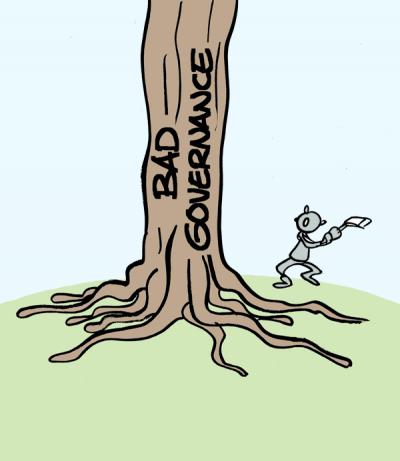The proposed introduction of the Good Governance and Integrity Reporting Bill by government has been hotly debated ever since the Bill has gone through its first reading. This in itself befits our democratic system and the Government needs to uphold this same spirit in keeping an open mind and accepting reasonable amendments which are being suggested from different quarters. After having given due consideration to all the aspects of the proposed law, Platform M would like to comment as follows.
As per the latest statements from the Prime Minister It is abundantly clear that the government is determined to go ahead with its proposal and is confident of obtaining the required votes in Parliament to amend the Constitution accordingly.
THE CONSTITUTION AMENDMENT BILL 2015
This bill aims to amend the constitution so as to enable relevant authorities to take possession of the property of a person where that person holds property “disproportionate to his income and which ownership cannot be satisfactorily explained.”
This proposed amendment can be construed as one which may deprive the Citizens of the country of their fundamental rights to protection from deprivation of property as presently guaranteed under Sections 3 (c) and 8 of the Constitution. It must be mentioned that the right to own property and the protection of the same , i.e “property rights” is considered to be a fundamental institution of a liberal and free market economy. Any perception that this is being trampled may send very poor signals to the investment community whether local or foreign. “Property rights” are one of the critical factors in assessing how business friendly a country is. It is very likely that such an amendment would considerably impair our status as a business-friendly nation. In case the Government chooses to go ahead with this amendment to the Constitution it is imperative that effective safeguards are introduced against arbitrary application of such powers.
THE ASSET RECOVERY (AMENDMENT) BILL 2015
Government has been at pains to convince the people that the purpose of this Bill is not merely to remove the Asset Recovery Unit from under the aegis of the office of the DPP (a constitutional institution) to be placed under the control of the Financial Intelligence Unit – set up under the Financial Intelligence and Anti-Money Laundering Act, with a politically appointed Director. Recent declarations of Minister Bhadain have sought to discredit the ability of the ARU to recoup monies which have been seized. The ARU has afterward come out with its own set of figures claiming to have frozen (as opposed to seized) almost Rs300M since its creation.
THE GOOD GOVERNANCE AND INTEGRITY REPORTING BILL
This is really the “pièce de résistance” of the government’s project whose stated purpose is to fight corruption, starting with the introduction of the concept of “unexplained Wealth” in our statute books. While most people do agree that corruption has reached untenable proportions and needs to be addressed as a matter of urgency the solution proposed by government seems questionable under a number of counts. The first controversial point is with regard to the retroactive aspect of the law which is generally considered with suspicion in any democratic context. As happens with the present case there is bound to be a degree of arbitrariness in such a decision as to the timing of the retroactive part. Besides there is the matter of principle regarding the fact that the sanctions to be applied bear the traits of a criminal punishment – in which case the question of retroactivity becomes utterly untenable in our system. The second objectionable point relates to the challenge of the basic right of the citizen to remain silent when faced with an offence. Again in this particular case although such offence is part of a piece of Civil legislation the punishment meted out has its origins in criminal law. The outcome is that this smacks of a device for flouting a basic procedural safeguard for the Citizen in the exercise of his rights to a fair defence. Thirdly is the fundamental question of presumption of innocence. Some critics have rightly pointed out that under the new law all the citizens of the country will be presumed to be theoretically guilty until proven innocent. This is clearly an unacceptable proposition in a democratic society as it scoffs at one of the basic tenets of our whole legal system which is entrenched in Section 10 of our Constitution. These three examples, which we have highlighted among others, all suggest a dangerous drift away from a time-tested process in which the protection of the citizens from arbitrary actions is strongly embedded.
Finally there is the utter confusion between the fact that the Bill which is proffered to be part of the Civil laws does in fact contain sanctions which bear all the hallmarks of a “criminal” legislation where a punishment (confiscation of property) is meted out to contraveners/offenders. This contradiction will need to be addressed before this Bill becomes law.
While it is clear that there are good intentions motivating the proponents of this new piece of legislation one needs to be reminded of the old adage about the road to hell being paved with good intentions. The majority of Mauritians are convinced that corruption has reached an unsustainable level and is distorting all social norms and moral values in our society. It needs to be dealt with accordingly. However, as much as we welcome the strengthening of our legal dispositions for dealing with the scourge we must sound a bell of warning when basic safeguards for the Citizen as enshrined in our Constitution seem under threat.
THE GOOD GOVERNANCE AND INTEGRITY REPORTING BILL
- Publicité -
EN CONTINU ↻
- Publicité -

